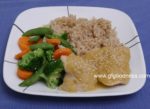Happy Celiac disease Awareness Month! To celebrate, let’s talk about how to eat gluten-free and healthy. Skip down for info on the 2018 GF Expo.
Gluten-free and Healthy
Going gluten-free can be a big turning point to greater awareness and eating healthier. All of a sudden, people need to start reading labels, and many begin to wonder why there are all of these ingredients they can’t pronounce and why high fructose corn syrup seems to be in everything. Or maybe after years of eating anything and staying slim, the pounds have started creeping upward, or blood pressure, blood sugar or cholesterol numbers are moving in the wrong direction.
Are you getting the nutrients you need?
Nutrition is important for everyone, but particularly for people who have food restrictions. While a gluten-free diet is absolutely necessary for everyone with Celiac Disease, there’s an abundance of highly processed, sugary foods out in the gluten-free aisle—often even more than conventional foods.
Years ago, the Food and Drug Administration realized that many people weren’t getting enough vitamins like thiamin, riboflavin, folate and iron. So they added a variety of nutrients to the foods supply in everyday foods like flour, bread, pasta, cereal, etc. However, gluten-free breads and cereals are considered specialty products, and very few are enriched with these vitamins. Not only that, but many gluten-free breads are filled with things like tapioca, potato and cornstarch to give a light texture, and these foods often are high in carbohydrates, but lower protein, vitamins and minerals. So when people switch from eating regular packaged foods to eating gluten-free processed foods, they don’t realize that they’re actually eating a lot fewer vitamins, minerals and fiber and usually more calories, too.
This is not inevitable! The good news is that that many healthy foods are naturally gluten-free, like fruits, vegetables, beans, many whole grains, nuts, seeds, and plain fish and poultry.
Also, for many people, untreated Celiac disease leads to nutrient deficiencies. Absorption of many nutrients happens through the villi in the small intestine. When these villi are damaged and flattened, fewer nutrients are absorbed. Because of this, people recently diagnosed with Celiac may even need more nutrients to make up for this. Iron, B vitamins, Vitamin D, calcium and magnesium are particularly important.
It’s awesome that there are now gluten-free brownies, donuts and beer. But just because they are gluten-free does not automatically mean good for you! Often in the beginning, people want to try anything that’s gluten-free, and are just focusing on getting through the day. The focus is on finding replacements for old favorites and learning all of the new rules. That is definitely a great short-term strategy but it’s only the first step!
Here are some suggestions to make your diet healthier:
- Go for healthy fats. Increase the amount you eat of fatty fish, like salmon, trout, flounder, sole, rockfish and more.
- Calcium is key! This can be from Greek yogurt, cheese, or milk, or if you avoid dairy, choose sardines, collards or turnip greens, beans, nuts, etc.
- Switch to a GF baking blend using sorghum, garbanzo beans, almond or coconut, brown rice or other whole grains.
- Have fruit or vegetable with every meal—5-9 servings a day. That can be as easy as an orange with breakfast, a veggie soup and a salad with lunch, dried fruit for snack and 2 servings of veggies along with dinner.
- Include legumes (i.e., dried beans and peas) with your meals regularly; increase your intake of these foods gradually to limit gas.
- Drink your water! 8 glasses a day are important to stay hydrated, especially when you increase the amount of fiber you eat.
- Include nuts and seeds several times a week, which also contain monounsaturated fats and can help control blood cholesterol levels.

- Find a way to reduce stress: acupuncture, meditation, deep breathing, talking to a friend, dancing, walking the dog, or whatever works for you. This under the umbrella of nutrition, because most people don’t reach for Brussels sprouts when they get stressed.
- Use healthy oils, like olive, avocado, etc. and eliminate trans fats.
- Limit sugar and high fructose corn syrup.
- Take care of yourself. This includes sleeping well, reducing stress, and doing things you enjoy. You’re worth it.
———————–
And, it’s about that time of year! Don’t miss the 2018 Washington DC Gluten-Free Expo and Education day, which is on June 10th! Learn more and register today at www.dcglutenfreeexpo.com
The expo sells out every year and it’s to benefit a wonderful cause–the Children’s National Medical Celiac Disease Center.
———————–
Cheryl Harris, MPH, RD is a Registered Dietitian Nutritionist and Certified Wellcoach in Fairfax VA. She helps people with a range of dietary issues, including Celiac Disease, GI issues, food allergies, pregnancy, breastfeeding, vegetarian and vegan diets, preventing diseases and “whole foods” eating. Let’s get you on your way to achieving your goals and feeling great! Email or call 571-271-8742.
